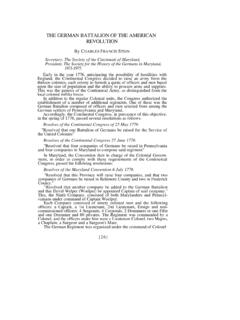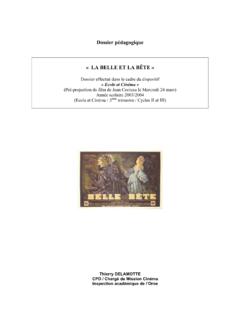Transcription of THE EMIGRATION SEASON OF 1738- YEAR OF THE …
1 THE EMIGRATION SEASON OF 1738 - year OF THE DESTROYING ANGELS By KLAUS WUST He let loose on them his fierce anger, wrath, indignation, and distress, a company of destroying angels. Psalm LXXVIII, 49. "Es ist ein gr ulicher W rg-Engel diss Jahr unter den Reysenden gewesen," a Germantown resident wrote on November 20th, 1738 to a fellow pietist in the County of "W rg-Engel" strangulating angel the Luther Bible calls the angels of disaster let loose by God on those who angered him by their conduct.
2 In a collective missive, written five days later, fifteen leading citizens of Pennsylvania and Jersey, almost all native Germans, also referred to the 78th psalm. After exempting those whom God bade to leave their home- land because some had suffered for their faith and others had faced extreme misery, the pious authors of the Send-Schreiben bore down on all others who merely sought wealth and an easy life in America. Such people, they wrote, "will go down with confused and burdened consciences, dispatched by their sins and by the destroying angels of righteousness.
3 " 2 What sounds like a harsh condemnation to modern ears was merely a way of dealing with the seemingly incomprehensible events of the year 1738 in the pietist terms of the times. The literature on Central European EMIGRATION of the eighteenth century is replete with horror stories of sufferings and death at sea. Past writers seem to have focused on occasional disasters and on the mismangement of the emigrant trade by greedy recruiters, shippers and captains. Certainly even an unevent- ful Atlantic crossing then was not free of hardships to the unsuspecting lands- man.
4 The poor standards of cleanliness and the obvious ignorance in matters of hygiene in those days had adverse effects on mass travel. An objective assess- ment, however, of the total German and Swiss migration to North America during that century reveals a rather successful operation of free market forces that enabled well over one hundred thousand souls to reach the desired destina- tion, many of them without even having sufficient funds to pay for the ocean passage.
5 It can also be stated that the more spectacular instances of considerable loss of life were related to prolonged waiting periods in temporary quarters on land and on board of ships detained in ports. This was particularly true with three projects for which governments or officially sponsored colonization companies were responsible. One was the half-hearted attempt of the English authorities to deal with the unexpected, yet not entirely unwanted, arrival of upwards of twelve thousand Germans in 1709 amidst a war.
6 Although the government [21] selected some 3,700 from among the sturdiest emigrants for settlement in New York and North Carolina, the ensuing ordeal for the people caught the or- ganizers completely off-guard. Crammed into hastily chartered ships, the people spent months waiting for a departure which was delayed by the war conditions at sea. An epidemic began to spread among the passengers which continued throughout the voyage and lasted well into the first weeks after arrival in America, Dubbed "the Palatine fever", the epidemic has been variously ex- plained as typhus or as one or another kind of typhoid fever.
7 The Mississippi scheme of 1720, when the Company of the West and the French government recruited more than 4000 people in southwest Germany, Alsace and Switzer- land, fared even worse. The same type of epidemic disease ravaged the ranks of the colonists held in the hurriedly created tent city at Lorient in the summer of 1720, and continued to claim such heavy losses during the transport to the Louisiana coast that only a few hundred survivors ever reached their assigned land.
8 An even more tragic end was destined for the Cayenne project of the French government in 1763 when almost all the emigrants perished from fevers at sea and after In all three cases the blame for the calamities could easily be laid on authori- ties inexperienced in handling such large numbers of individuals and families who were already weakened from spending weeks of traveling toward the ports of embarkation. The situation in 1738 was quite different.
9 The well over six thousand emi- grants heading for North America during that fateful year were not part of a colonization scheme of any government or proprietor. They belonged to the many thousands who shared in an individual EMIGRATION pattern that had evolved since 1717 and had become the typical way of reaching English colonies in America. As individuals they banded together in family and often in village groups and set out for Rotterdam or Amsterdam where every year a number of British ships, returning with colonial staples, were available for such transport on their way back to Philadelphia and Charleston.
10 The redemption system by which passengers were taken aboard after merely signing a contract to pay their fares within a designated time after arrival had proven satisfactory to all parties concerned. Thus payment could be made by the passengers themselves in cash or from the proceeds of the sale of goods brought along for that purpose, or by relatives and friends already in America, or, what was becoming increasingly common, by parties to whom they indentured themselves to work off the cost of passage.



